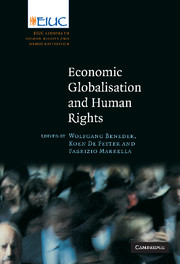Book contents
- Frontmatter
- Contents
- List of contributors
- Series editors' preface
- Preface
- List of abbreviations
- Introduction
- PART I Inter-disciplinary Perspectives on Human Rights and Economic Globalisation
- PART II The Relevance of Human Rights for International Economic Organisations
- The World Trade Organization and Human Rights
- Making Trade Policies More Accountable and Human Rights-Consistent: A NGO Perspective of Using Human Rights Instruments in the Case of Access to Medicines
- The Bretton Woods Institutions and Human Rights: Converging Tendencies
- PART III International Corporate Accountability
- Index
The World Trade Organization and Human Rights
Published online by Cambridge University Press: 09 July 2009
- Frontmatter
- Contents
- List of contributors
- Series editors' preface
- Preface
- List of abbreviations
- Introduction
- PART I Inter-disciplinary Perspectives on Human Rights and Economic Globalisation
- PART II The Relevance of Human Rights for International Economic Organisations
- The World Trade Organization and Human Rights
- Making Trade Policies More Accountable and Human Rights-Consistent: A NGO Perspective of Using Human Rights Instruments in the Case of Access to Medicines
- The Bretton Woods Institutions and Human Rights: Converging Tendencies
- PART III International Corporate Accountability
- Index
Summary
Introduction
The topic of ‘The World Trade Organization (WTO) and Human Rights’ has been the subject of much controversy as well as increasing academic interest. Anti-globalisation groups blamed the WTO for not being sensitive to the consequences of its legal rules which can result in serious human rights violations. The former United Nations High Commissioner for Human Rights (UN HCHR), Mary Robinson, basing her comments on numerous resolutions and reports adopted in UN human rights bodies, has emphasised the need to investigate the relationship between international trade liberalisation and human rights. This has been responded to by the academic community in a growing number of publications. Since the time of the General Agreement on Tariffs and Trade (GATT), the United States has called for recognition of ‘workers' rights’, i.e. social standards, in GATT and WTO rules, and also the European Communities have proposed to give more attention to non trade issues. However, the developing country members of the WTO, in particular, have largely resisted any efforts to deal with non-economic issues in the WTO and successfully requested the elimination of these issues from the agenda of the Doha Round as part of the ‘July package’ of 2004. Only the issue of ‘trade facilitation’ survived from the so-called ‘Singapore issues’, which besides investment and competition originally also covered basic workers' rights.
- Type
- Chapter
- Information
- Economic Globalisation and Human RightsEIUC Studies on Human Rights and Democratization, pp. 137 - 169Publisher: Cambridge University PressPrint publication year: 2007
- 2
- Cited by



